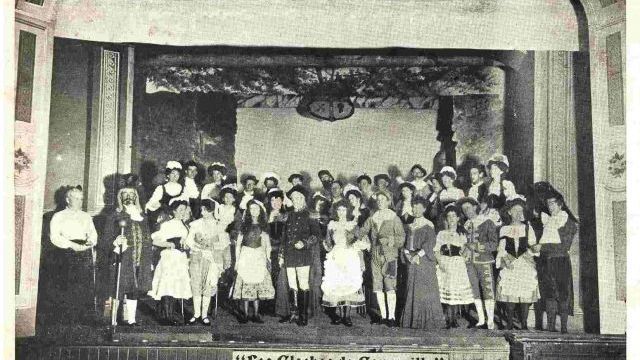Our Early Amateurs
Some little time ago I found this postcard promoting the Railway and Tramway Musical Society production of the comic opera Les Cloches de Corneville. The reverse revealed that the production was at the Railway Institute on February 1 & 2 1907, and that tickets cost 2 shillings and 1 shilling, with reservations at 6d extra available at Palings. A company member had spent a penny in postage to encourage family members to attend. 102 years later, I suppose we’d SMS, email or twitter a reminder today. I suppose I'll never know whether Miss Russell of Balmain got along to see her thespian relative.
Let’s share some other snippets of Australia’s early amateur theatricals.
The Leader of October 14, 1876 indicates that much earlier Melbourne amateur performances were also industry related.
“A dramatic performance in aid of Melbourne Printers’ Library was given in the Princess’ Theatre on Saturday evening. There was a very good attendance in all parts of the house. The entertainment commenced with the farce of the Unfinished Gentleman, all the characters in which were sustained by members of the typographical craft. For an amateur undertaking it was more than usually successful, the cast being well made out, and the actors themselves thoroughly imbued with a spirit of emulation. Messrs. W. W. Dudley, Munro, and G. Wilson were the recipients of a special mark of favor, a call being accorded them on the curtain falling. Miss Emma Wiepert (Mrs. Patey) sustained the role of Mary Chintz, and her professional assistance was of great service. A musical melange followed; after which came an original, farcical sketch, entitled Publishing Day, or the Mishaps of a Country Editor, which afforded great amusement, and was thoroughly enjoyed by the audience, as the salient points depend upon press technicalities, which were of course thoroughly understood. A little judicious excision would have rendered the piece more lively, and greatly enhance its dramatic value. It is probable that the performance will be given in Ballarat and Geelong.”
The Princess’ Theatre mentioned would have been the timber structure that preceded the cherished iconic Melbourne Theatre on the same site.
It was the name of an amateur dramatic society mentioned in The Bulletin on January 15, 1881 that caught my eye.
“The Tamworth Amateur Dramatic Club and Matrimonial Encouragement Society” is flourishing like a young bay tree. The only two lady members were married to two gentlemen members on the night after the last performances and following this movement it is said the secretary has already received applications for membership from over 50 spinsters in the district - ages ranging from 20 to 45. England expects every man will do his duty.
In December 1881, The Bulletin reported a Sydney suburban performance.
“The Burwood amateurs played - of all pieces! - Colman’s “Heir-at -Law,” at the local School of Arts, last Friday night, and enjoyed themselves immensely. A Mr. Thompson played Dr. Pangloss in a manner which did not remind us of John S. Clarke, and the Lord Duberly of a Mr. Matthews recalled to our mind, with great distinctness, the great Gustave Gubbins, of glorious histrionic memory. The rest of the characters were played as only the Burwood Club can play them, and the individual efforts of each performer to get down to the footlights, regardless of the stage directions, were beyond all praise. The shoe-buckles of the ladies were much admired, and when Miss Cicely Homespun learns what to do with her hands, she will be a performer of much promise. We consider her to be, at present, rather too conscious of her stockings.”
The Age on November 1, 1926 reported the amateur production of a locally-written musical comedy, The Flapper, by Prahran Operatic Society in Prahran Town Hall on November 3 to 5, with a cast in excess of 60, the most ambitious production the society had attempted, with the proceeds going to 1st Hawksburn Boy Scouts.
A prop mal-function yarn in The Bulletin’s Poverty Point correspondence column on September 28, 1928 tickled my fancy.
Recent mention of real shooting on the stage reminds me of some amateurs at Temora (N.S.W.) who were playing "The Parson's Oath." The bullets were removed from six cartridges and soap substituted. The gun was not used at rehearsals, and when the night of the play happened along the soap was as hard as wood. The villain fired the whole six bullets at the policeman with great enthusiasm and scored a hit every time. When the curtain dropped there was something of a tragedy behind the scenes, the policeman going after the villain's blood. To this day that stage bobby is convinced that there was something more solid than soap in that gun.
Do you share my interest in our early amateur theatricals? I’m at least third generation amateur theatre, dating back to my grandmother’s involvement in Petersham and other Sydney musical societies in the 1920s and 1930s.
I’d love to add your snippets about our amateur theatre history to this article. Please contact me via our email contact form.
Neil Litchfield

